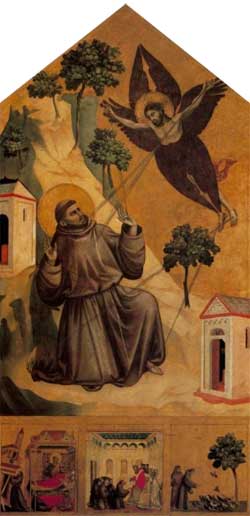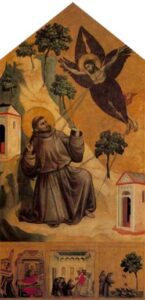
Early in the 13th century, Pope Innocent III commissioned the Lateran Council to put in place new reforms. At the time, the Church was becoming increasingly wealthy. Priests lived in lavish monasteries and dressed in expensive clothing. Yet there was a backlash against such luxury. In particular, Jesus had mentioned that “it is easier for a camel to go through the eye of a needle than for a rich man to enter the kingdom of God.” How could the Church, and even the merchants who were growing exceedingly wealthy, reconcile such discrepancies?
It was during this climate that Francis of Assisi began preaching his doctrine of love and poverty. Francis was born in 1182 to a wealthy merchant. In 1201, he joined a military expedition against Perugia and was held for a year as a prisoner of war. When he was released, he spent much time contemplating what he should do with his life.
His quest took him to the Church of San Damian where he had his first vision – the crucifix pointed at him and a voice said. “Go, Francis, and repair my house, which as you see is falling into ruin.” Startled, he took it to mean literally the church he was in and soon changed his life.
To the horror of Francis’ father, Pietro, rather than joining the family business and becoming a merchant, Francis committed to a life of poverty and gave away all his possessions. It got so bad that Pietro sued him for fear he’d give away everything. Francis took the opportunity to sever ties with his father and soon began preaching.
Francis acquired 12 followers and went to Pope Innocent III for permission to start a new Order devoted to a life of poverty. Initially, the Pope dismissed them, but that night, he had a dream of the Church collapsing and Francis holding it up. He gave them permission for the new Order and the Franciscans were born.
An ascetic bunch, the Franciscans could not hold property. They went from place to place working and begging for food without aim or direction.
Francis brought a new perspective to Christianity through his preaching. While his core message was love of God and one another, he also preached that the world was an emanation of God and inherently good. This was in starch opposition to the prominent theology of Augustine, who believed Christians should renounce the world. He was also the first to preach about Jesus in the manger, the helpless infant that we could identify with and love rather than fear.
Eventually, Francis’ own Order turned against him and he retreated to Mount Verna to live a life of solitude. On September 14, 1224, Francis received the first recorded stigmata, the wounds of Christ in his hands, feet, and on his side.











 Mystic Profile: Bernard of Clairvaux
Mystic Profile: Bernard of Clairvaux